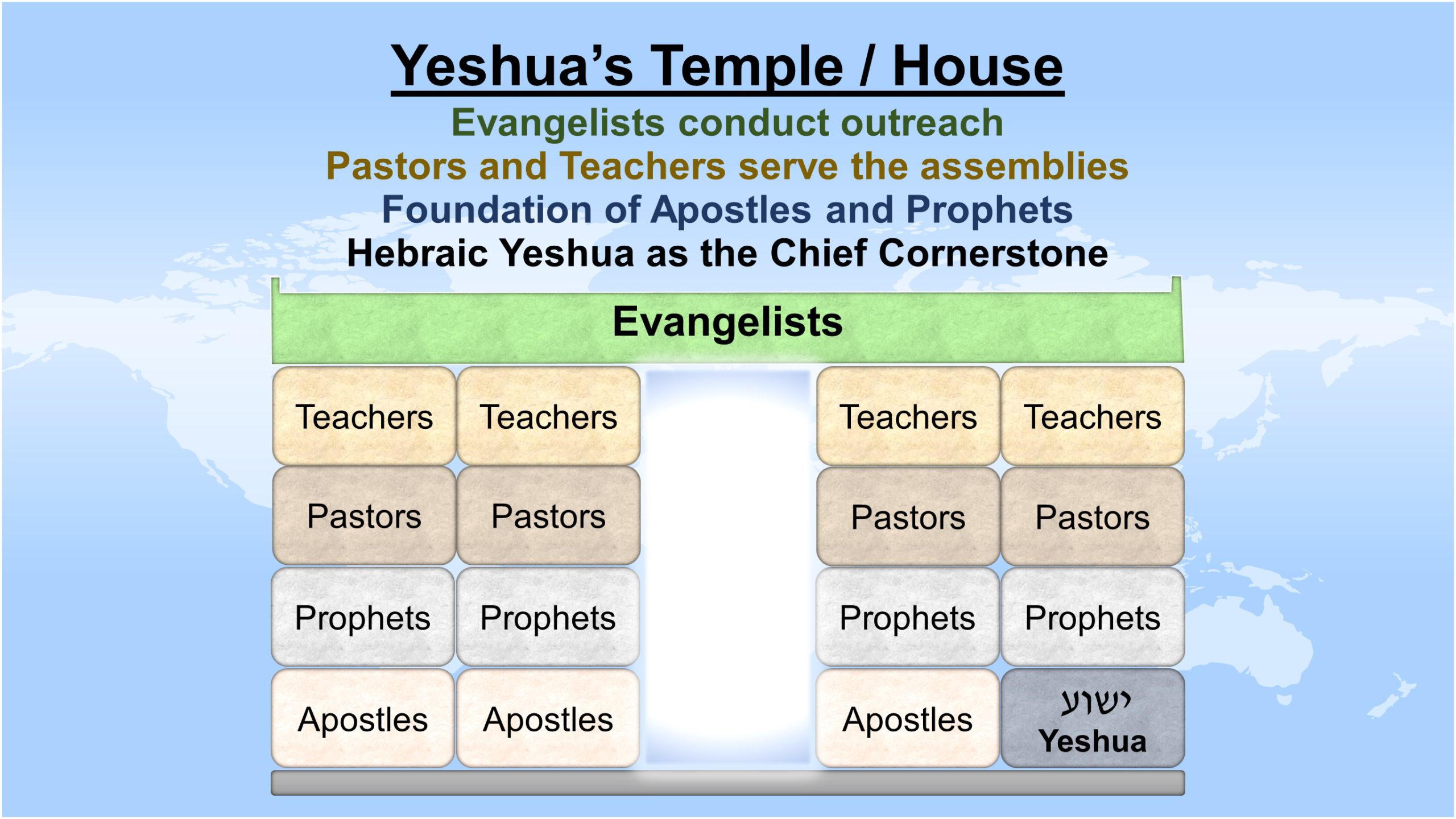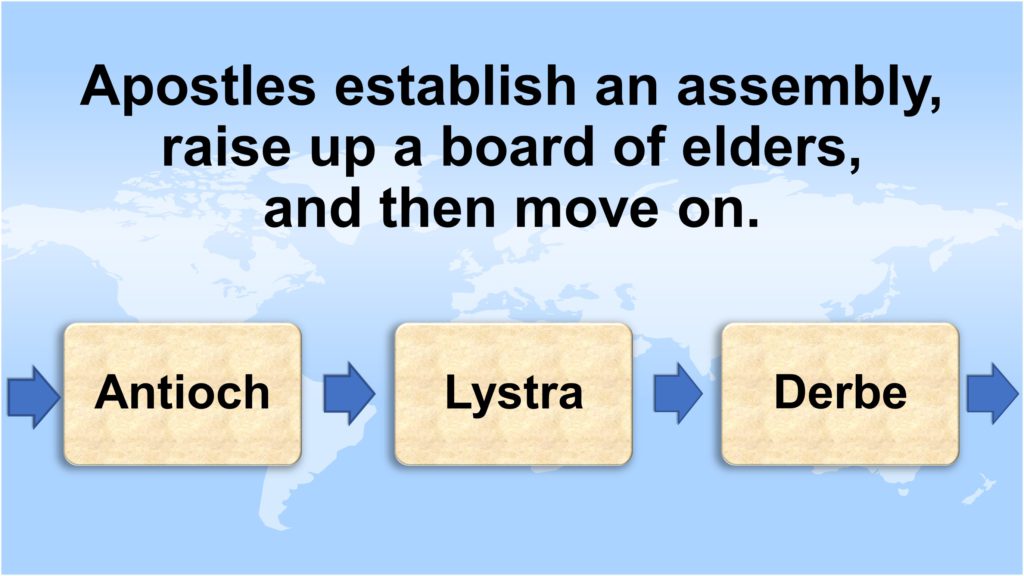
In earlier chapters we saw how Yeshua came to replace the corrupted rabbinical order with a renewed order of Melchizedek. We also saw how the Spirit sent Shaul and Bar Naba out to preach Yeshua to the returning Gentile Ephraimites. In Acts 15 it was ruled that once the Gentile Ephraimites agreed to abstain from four abominations they could attend the Jewish synagogues in their town, where they could hear the Torah of Moshe preached on the Sabbath. This implies that attending the synagogue service needed to be a regular part of their walk (just as it had been Yeshua’s custom during His lifetime).
Ma’asei (Acts) 15:19-21
19 “Therefore I judge that we should not trouble those from among the Gentiles who are turning to Elohim [by telling them to keep the rabbinic Gentile Conversion process],
20 but that we write to them to abstain from things polluted by idols, from sexual immorality, from things strangled, and from blood.
21 For Moses has had throughout many generations those who preach him in every city, being read in the synagogues every Sabbath.”
After the Nazarenes were expelled from the synagogues through the imposition of the Birkhat HaMinim, they had to form their own congregations. What we need to see in this chapter is how those congregations are supposed to be formed and led in the Melchizedekian order.
In Ephesians 4, Yeshua Himself gives us five ministry gifts. Ephesians 4 lets us know that Yeshua expects us to use these ministry gifts to unify and edify our body, and to become more like Him.
Ephesim (Ephesians) 4:11-16
11 And He [Yeshua] Himself gave some to be apostles, some prophets, some evangelists, and some pastors and teachers,
12 for the equipping of the set apart ones for the work of ministry, for the edifying of the body of Messiah,
13 till we all come to the unity of the faith and of the knowledge of the Son of Elohim, to a perfect man, to the measure of the stature of the fullness of Messiah;
14 that we should no longer be children, tossed to and fro and carried about with every wind of doctrine, by the trickery of men, in the cunning craftiness of deceitful plotting,
15 but, speaking the truth in love, may grow up in all things into Him who is the head — Messiah —
16 from whom the whole body, joined and knit together by what every joint supplies, according to the effective working by which every part does its share, causes growth of the body for the edifying of itself in love.
Verse 13 says we are to organize according to these gifts until we all come to the unity of the faith in love, and until we all become perfect men (i.e., like Yeshua). Since our body is not presently united, and since we ourselves are far from perfect (both as individuals, and as a body), we are still supposed to be refining ourselves by these fivefold ministry gifts.
When we talk about these fivefold ministry gifts as a means of refinement, we should note that there is also a specific way these gifts are to work together. Ephesians 2 tells us that the living temple is supposed to be built on what it calls the foundation of apostles and prophets.
Ephesim (Ephesians) 2:19-22
19 Now, therefore, you are no longer strangers and foreigners, but fellow citizens with the saints and members of the household of Elohim,
20 having been built on the foundation of the apostles and prophets, Yeshua Messiah Himself being the chief cornerstone,
21 in whom the whole building, being fitted together, grows into a set apart temple in Yahweh,
22 in whom you also are being built together for a dwelling place of Elohim in the Spirit.
What this means is that the apostles and prophets play a special foundational role, in that they establish the doctrine. We already saw an example of this in Acts 15, where the foundation of apostles and prophets met to decide a difficult theological question as the council of apostles and elders.
Ma’asei (Acts) 15:6
6 Now the apostles and elders came together to consider this matter.
The reason for the Acts 15 council was to settle a difficult theological question, so that Yeshua’s body would not become divided. As we saw in Nazarene Israel, a belief set classifies as a nation in Scripture. Had there been more than one official belief set, then there would have been two nations, and they would have separated. This is just as the rabbinic Messianic Jews today do not mix with the Nazarenes (but the two are separate).
Mattityahu (Matthew) 12:25
25 But Yeshua knew their thoughts, and said to them: “Every kingdom divided against itself is brought to desolation, and every city or house divided against itself will not stand.”
But if we must have a single doctrine to unite around, it must also be Elohim’s doctrine, or we will not be able to walk in unity with Him.
Amos 3:3
3 “Can two walk together, unless they are agreed?”
So if there must be only one doctrine, and if it must be Elohim’s doctrine, then the council that establishes that doctrine must be made up of those who hear in the Spirit, and can articulate what they hear. As we show in Torah Government, these are the apostles and the prophets, because apostles and prophets are the two classes of gifts that (by definition) hear in the Spirit. (Not that the other gifts cannot hear in the Spirit, but, by definition, the apostles and prophets can.)
Now we need to understand how the ministry gifts (of apostles, prophets, evangelists, pastors, and teachers) relate to the positions of service (apostles/priesthood, elders, deacons, and people). While any of us can have any (or all) of the gifts (apostle, prophet, evangelist, pastor, or teacher), our position of service in the body is determined by finding the place where we can best serve. Thus, one man with an apostolic gifting might be called to the priesthood (where he might serve as an apostle), whereas another man with an apostolic gifting might serve as an elder in a congregation. The apostolic gift indicates that he can fill a lead role. He still needs to be accountable to the apostolic foundation (as Shaul had to report to Yaakov in Acts 21), but he can operate without oversight for periods of time. In Acts 15 what the phrase “apostles and elders” refers to is the apostles of the priesthood, and the spiritual elders (leaders) of the congregations.
(For more information about the gift of prophecy and hearing in the Spirit, see “About Speaking in Tongues,” in Nazarene Scripture Studies, Volume One.)
Ephesians 2:20 says that Yeshua Messiah is the chief cornerstone of this doctrinal foundation. We can perhaps visualize it this way.

In this image, Yeshua’s true apostles and prophets are in spiritual connection with Yeshua. This means they must have a deep abiding relationship with Yeshua in the Spirit (e.g., John 15).
Yochanan (John) 15:5
5 “I am the vine, you are the branches. He who abides in Me, and I in him, bears much fruit; for without Me you can do nothing.”
Together they form a theological foundation upon which a spiritual house of worship can be built. That is why the other ministers (evangelists, pastors, and teachers) must build upon their foundation, and not lay any other foundation.
Qorintim Aleph (1 Corinthians) 3:10-15
10 According to the favor of Elohim which was given to me, as a wise master builder I have laid the foundation, and another builds on it. But let each one take heed how he builds on it.
11 For no other foundation can anyone lay than that which is laid, which is Yeshua Messiah.
12 Now if anyone builds on this foundation with gold, silver, precious stones, wood, hay, straw,
13 each one’s work will become clear; for the Day will declare it, because it will be revealed by fire; and the fire will test each one’s work, of what sort it is.
14 If anyone’s work which he has built on it endures, he will receive a reward.
15 If anyone’s work is burned, he will suffer loss; but he himself will be saved, yet so as through fire.
With the theological foundation in place, Shaul and the other apostles could focus on building assemblies. That is why, as Shaul went about his ministry voyages, he not only met with the people, but he also sought out spiritual elders who could lead the assemblies in his absence.

Titus 1:5 shows us that it is the priesthood’s job to qualify and appoint elders.
Titus 1:5
5 For this reason I left you in Crete, that you should set in order the things that are lacking, and appoint elders in every city as I commanded you —
We will look at the rules for appointing elders later, but it is not necessary for elders to have apostolic or prophetic gifts. It is nice if they do, but since most people need evangelism, pastoring, and teaching, their needs can be well served if an assembly has three elders, one of which is a pastor, another an evangelist, and another one a teacher.
There are at least six levels of authority and organization in Titus 1:5. We have already seen that Shaul reported to the foundation of apostles and elders (in Acts 15 and Acts 21). In turn, Shaul provided covering for Timothy, and Timothy appointed elders in every city. The elders provide cover for the deacons (congregational servants), and the congregational servants provide covering for the people. This creates a global kingdom for Yeshua.
In the next chapter we will talk about the qualification of elders and servants.